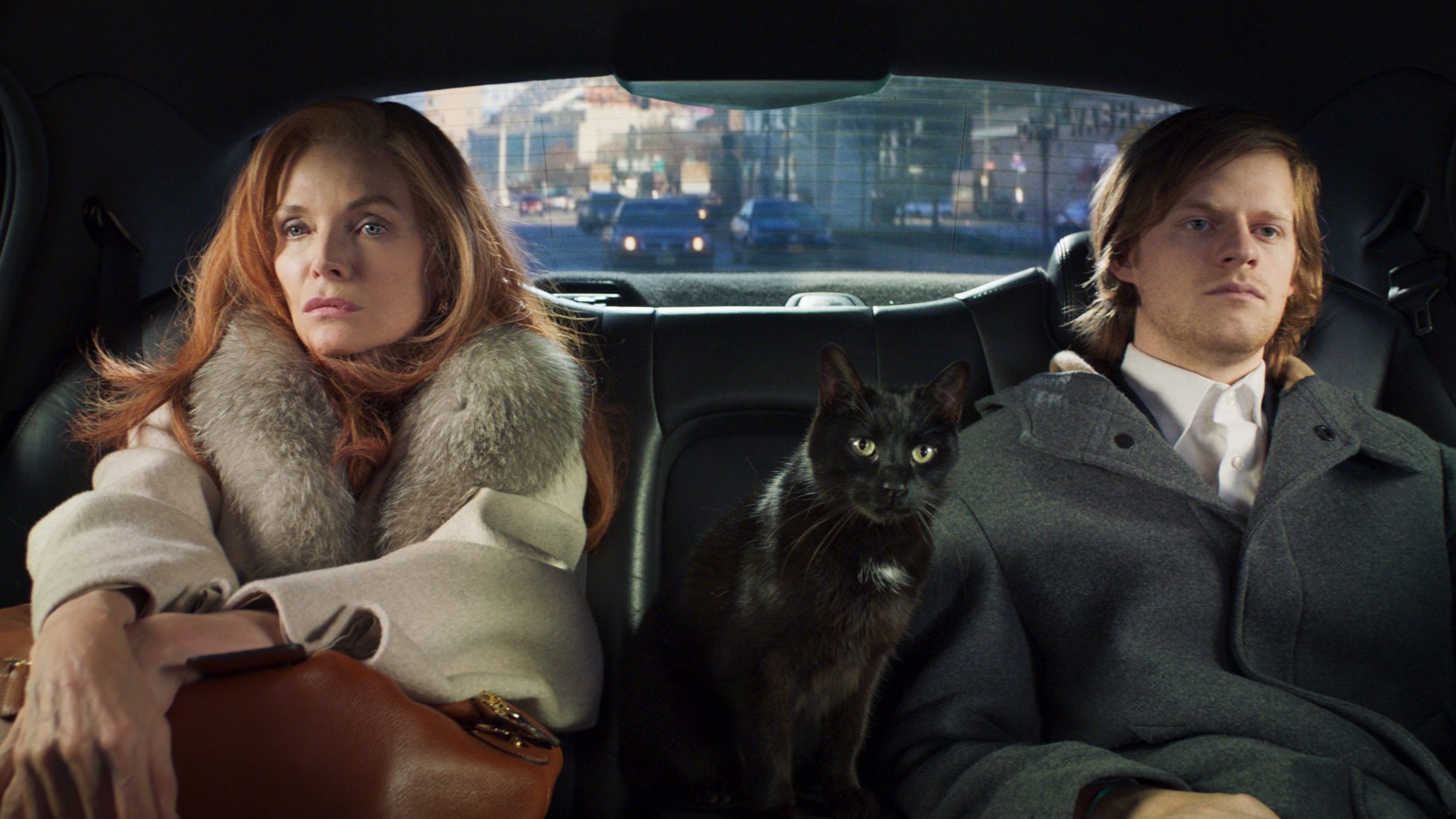What to Watch Verdict
'French Exit' is strange, flabby, and hard to pin down, yet strangely rewarding.
Pros
- +
Michelle Pfeiffer is excellent as always.
- +
🚪Writer Patrick DeWitt's dialogue is a perpetual puzzle box of double meanings.
- +
🚪The film's most absurd moments are complemented well by the hard subjects it meditates upon.
Cons
- -
🚪The oddity of the tone can be a huge turn-off.
- -
🚪It takes about half the runtime before the film finally clicks into place as a discernable entity.
French Exit is currently only available to watch in theaters (as of February 12, 2021). Due to the COVID-19 pandemic, we recommend checking it out at your local drive-in. If one isn’t available, please be sure to check out state and CDC guidelines before watching in an enclosed space.
The best descriptor for the overall energy of French Exit is “odd.” Any adaptation of Patrick DeWitt’s novel was inherently going to be strange, especially with a screenplay written by the same author, but there’s still something unsettlingly absurd about a film that can contain nary the hint of the supernatural for nearly an hour, only for the characters to hold a séance to summon the disembodied voice of Tracey Letts and no one bats an eye when it works. In many ways, this film’s bizarre conflux of contradictory tones and off-beat plot cul-de-sacs doesn’t really come together in a satisfying, cohesive whole, but once you become acclimated to the oddity of it all, it presents an undeniable, ineffable charm.
Widow and New York socialite Frances Price (Michelle Pfeiffer) has just found out that her dead husband’s wealth is about to run out, leaving her and her adult son Malcolm (Lucas Hedges) destitute. At the behest of her friend Joan (Susan Coyne), Frances sells off as much of her property as she can and takes a cruise to France with Malcolm, a sack of cash, and a smuggled cat to stay in Joan’s Paris apartment. While there, Frances and Malcolm attempt to establish a new life for themselves, though they are inextricably bound to the past they left behind.
For as much as this set-up would imply a sort of riches-to-rags comedy, the film never really deviates from its erudite trappings, instead opting to eschew a conventional structured arc for the Prices and build upon its cast of characters like a collection of captured Pokémon, more novel for their very existence than their depth as acted personas. There are the obvious archetypes, like Malcolm’s fiancée (Imogen Poots), frustrated that Malcolm hasn’t told his mother of their engagement, or Mme. Reynard (Valerie Mahaffey), a lonely fellow widow who calls upon Frances with the hopes of befriending someone with similar experiences. But then there are the more offbeat characters, such as Danielle Macdonald’s cruise line psychic with a penchant for detecting the imminence of death, or Isaach De Bankolé’s private investigator who has approximately five minutes of plot utility before hanging around the apartment for no adequately explored reason.
It’s frustrating that so few of these hangers-on have much to do in the story after their purpose has been served, but one gets the feeling that this is what DeWitt and director Azazel Jacobs are going for as they build a community of ill-fitting misfits around the most ill-fitting loner of them all. Pfeiffer plays Frances with an aloof candor, without concern for the rudeness of her demeanor but also absent malice or contempt. This is in part due to DeWitt’s inclination to write his characters with unnatural, cryptic speech patterns, but it’s also indicative of an underlying sadness to her character in particular, a loneliness that is only ameliorated by the loyalty of her son that may have even existed while her husband was alive.
It takes a while to click into place, but French Exit reveals itself to be a meditation on long-term grief, a tragic absurdity it comfortably shoves within a heartbeat of gleefully revealing a surreptitious dildo in someone’s freezer. As Frances considers the loss of her financial independence as the gateway to a literal end to her life, she passes out stacks of cash to members of the service industry and to homeless people, not out of generosity, but to accelerate the process of her annihilation. The situations themselves are funny as she throws hundreds of euros away on the most extravagant tips imaginable, but the underlying meaning is sad, and the film wants you to sit with that contradiction as it combatively dares you to laugh your way through the awkwardness.
As much as this makes French Exit an interesting film to parse, it’s also an exercise of intellectual intrigue over emotional engagement, almost by necessity as it explores its empathetic contradictions. DeWitt could have better served his lead character by paring down some of his more extraneous hangers-on from his book, but they’re also such an integral part of the story’s overstuffed, meandering identity that it would feel disingenuous to deny Frances that found community. The resulting film is strange, flabby, and hard to pin down, especially in the first half where its intentions are more opaque. Yet it’s also strangely rewarding if you stick with it, which might be just enough to make this an oddity worth recommending.
The latest updates, reviews and unmissable series to watch and more!
French Exit releases in theaters on February 12, 2021.
- The best Amazon Prime movies
- Amazon is right: You don't own your digital media
- The best shows on Amazon Prime
- New movies on Amazon Prime
Leigh Monson has been a professional film critic and writer for six years, with bylines at Birth.Movies.Death., SlashFilm and Polygon. Attorney by day, cinephile by night and delicious snack by mid-afternoon, Leigh loves queer cinema and deconstructing genre tropes. If you like insights into recent films and love stupid puns, you can follow them on Twitter.


